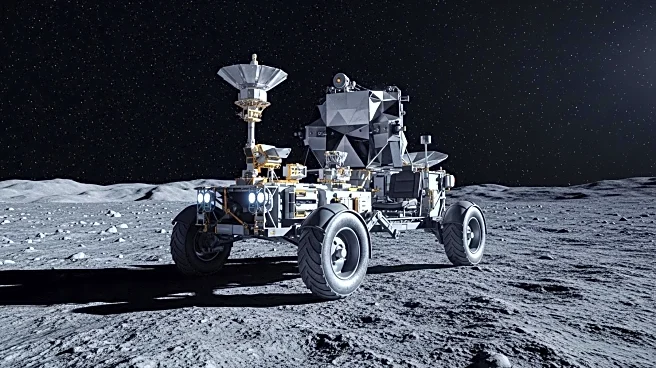What's Happening?
NASA has announced the revival of its VIPER (Volatiles Investigating Polar Exploration Rover) mission, targeting a 2027 lunar landing with the assistance of Blue Origin. The mission, which had previously faced delays and cost-related issues, will involve the transportation of the VIPER rover to the moon's South Pole using Blue Origin's Blue Moon Mark 1 lander. This initiative is part of NASA's Commercial Lunar Payload Services (CLPS) program, which aims to identify and study lunar water ice, a potential resource for future missions under the Artemis program. Blue Origin will be responsible for planning and executing the rover's delivery and deployment on the lunar surface.
Why It's Important?
The collaboration between NASA and Blue Origin for the VIPER mission is significant for several reasons. Firstly, it marks a renewed effort in lunar exploration, focusing on the moon's South Pole, an area believed to contain water ice. This resource could be crucial for sustaining future lunar missions and potential colonization efforts. The mission also highlights the growing role of private companies like Blue Origin in space exploration, showcasing the importance of public-private partnerships in advancing scientific and exploratory goals. Success in this mission could pave the way for more ambitious projects under NASA's Artemis program, aimed at establishing a sustainable human presence on the moon.
What's Next?
As the mission progresses towards its 2027 target, several steps are anticipated. Blue Origin will continue to develop and test the Blue Moon Mark 1 lander to ensure it meets the requirements for safely delivering the VIPER rover to the lunar surface. NASA will likely conduct further studies and simulations to optimize the rover's capabilities in identifying and analyzing lunar water ice. Stakeholders, including scientific communities and space exploration advocates, will be closely monitoring developments, potentially influencing future funding and policy decisions related to lunar exploration.
Beyond the Headlines
The revival of the VIPER mission also raises broader questions about the future of space exploration and the role of private companies in these endeavors. Ethical considerations regarding the exploitation of lunar resources and the environmental impact of increased lunar activity may become more prominent as missions like VIPER progress. Additionally, the technological advancements required for this mission could spur innovation in other sectors, potentially leading to new applications and industries.








